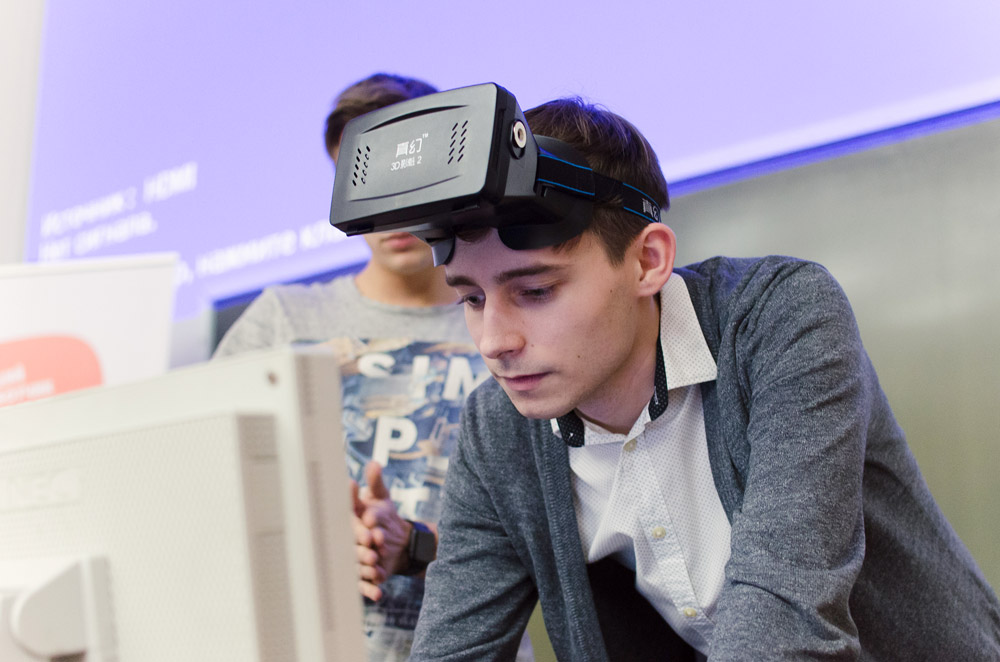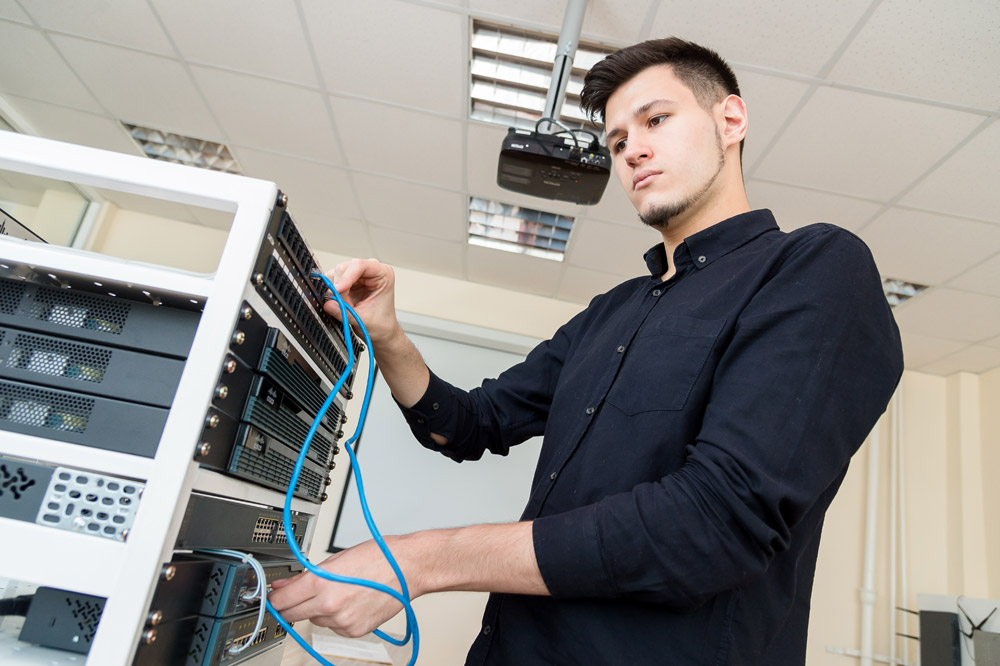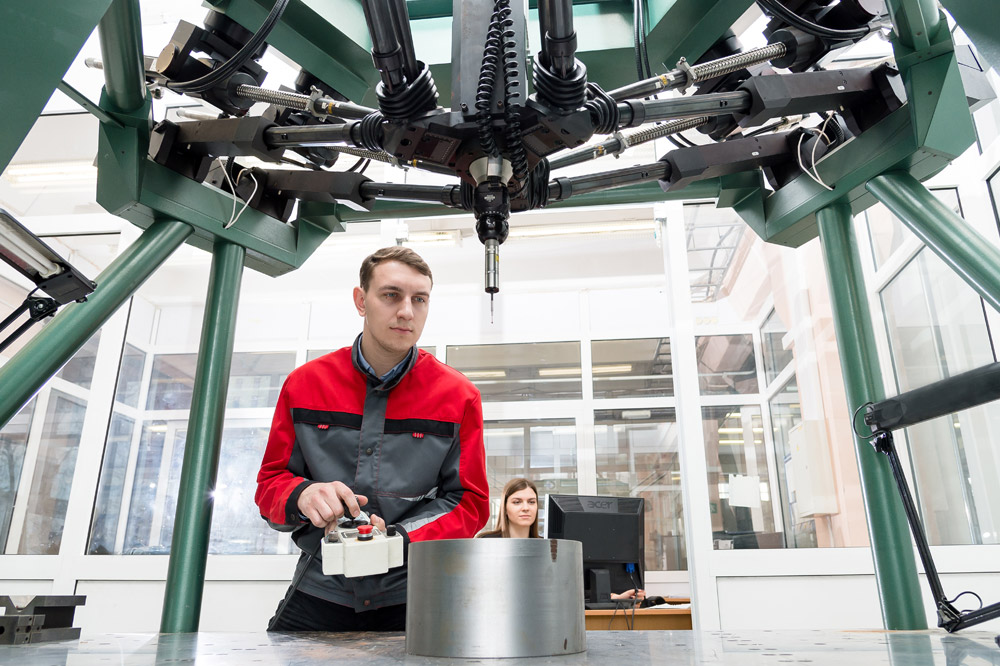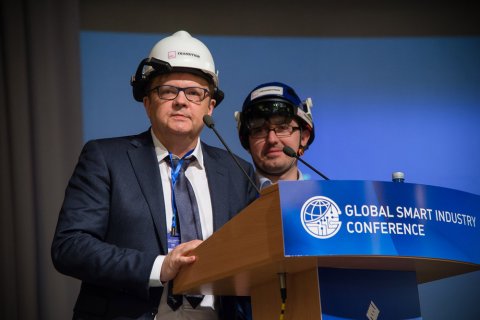Following the SUSU strategy of developing as a “SMART university uniting Europe and Asia” and meeting the demands of the Russian Federation on boosting the economic growth and technological development, improving national security, and on the breakthrough fields of scientific research, the university is focusing on developing big interdisciplinary projects in the fields of digital industry and artificial intelligence. The studies are carried out on the facilities in metallurgy, mechanical engineering, power engineering, housing and public utilities, safe environment in urban infrastructure, and human comfort.
The work being carried out within these fields covers the following:
- Sensors of an Industrial Object;
- Digital Twins;
- Energy Saving;
- Methods and Means of Information Protection;
- Material Science;
- Ecology.
In each component different structural subdivisions of SUSU are involved, which deal with natural sciences, mathematics, computer sciences and humanities. Students have an opportunity to participate in this research as part of the project-based learning launched in 2018.

The Sensors of an Industrial Object and Methods and Means of Information Protection components include the development of competences in the following fields:
- physical parameters sensors;
- information transmission and storage;
- information processing;
- evaluation of equipment condition;
- information protection;
- mathematical methods of data processing.
The Digital Twins component, which is based on physical and mathematical models of technological units and processes, includes the development of competences in the fields of:
- parameters identification;
- evaluation of an object condition;
- predicting the object condition, artificial intelligence;
- technologies of virtual reality and augmented reality.
The Energy Saving component includes the development of competences in the fields of:
- evaluation of the condition of a power engineering unit or system;
- developing the algorithms of automated systems of energy-efficient operation.
The Material Science component includes the development of competences in the fields of:
- new functional materials;
- additive technologies;
- composite materials;
- sorbing agents;
- monocrystals.
The Ecology component is among the priority research fields, both for the Chelyabinsk Region and for other industrial municipalities in the Russian Federation.
.jpg)
The following tasks are currently being solved at SUSU to address the ecological problems:
- Development of special sorbing agents with the property to neutralize hazardous effects of heavy metals and radionuclides, while turning themselves into inert mineral, which is safe for the environment.
- Engineering of a digital system of ecological monitoring of pollutants dispersion in the air, which will feature an option of visualizing the atmospheric pollutants dispersion on an interactive map.
- Designing of new materials and technologies for “green” power engineering. For instance, the university is working on creating the materials for solar batteries, which will allow to improve the efficiency of the latter and reduce specific costs of the power generation.

To reach the set goals, 40 research-and-development laboratories and research-and-education centres are functioning at SUSU.
Over the period of 2016—2018, world-class scientific laboratories were created at SUSU as part of the collaboration with the leading foreign scientists from Australia, United Kingdom, Germany, India, Canada, Mexico, USA, and France.
In 2018—2019 the university has kept evolving as a leading international scientific centre.
Thus, for instance, in 2018 SUSU opened 3 laboratories important for the university’s priority development:
- SUSU-Emerson Laboratory working in the field of digital technologies and production automation;
- Samsung IoT Academy Laboratory dealing with the Internet of Things;
- Laboratory of Functional Materials, which was created in the collaboration with Darmstadt University of Technology and Helmholtz-Zentrum Dresden-Rossendorf, deals with the development of a new promising technology of gas liquefaction based on the magnetocaloric effect.
It has been announced that Digital Industry Research and Education Centre will be opened in 2019. At the SUSU's Mechanical Engineering Research Institute a unique milling unit is installed, based on KUKA six-axis industrial robot, which allows to study the technologies of processing complex parts for mechanical engineering, power engineering, and metallurgy.
An important event in the field of breakthrough scientific research over the past year was the holding of 2018 Global Smart Industry Conference(GloSIC’2018), which was organized in Russia for the first time and was supported by Emerson transnational corporation. More than 500 representatives of the world science and business took part in this conference.

SUSU is actively working on the projects on creating high-technology production, within the frameworks of fulfilling the Russian Federation Government Resolution No. 218. Since the year of 2010 the university’s 10 applications were announced as winners.
Currently, 2 projects are being fulfilled by the university:
- Creating of High-technology Production of the New Generation of Power-efficient Transmission Gears for Trucks and Buses, jointly with KAMAZ PTC.
The fulfilment of this project allows to improve the consumer performance ensuring the technological independence of the Russian cargo vehicle manufacturing; - Engineering of a Stageless Differential Steering Mechanism with a Follow-up Control System for the New Generation of Off-road and Road-building Machines, jointly with OOO PK Khodovye Systemy.
The control system will allow to improve the traffic safety and reduce driver fatigue.
Breakthrough projects under the Federal Targeted Program on Research and Development in the Priority Fields of the Science and Technology Sector of Russia for 2014-2020 are in the process of fulfilment jointly with the following industrial partners:
- OOO ElMetro Group – project on Development of Domestic Mass Coriolis Flowmeter for the Oil and Gas Industry with the Function of Measuring the Capacity of Multiphase Flows, headed by SUSU Rector, Doctor of Sciences (Engineering), Professor Aleksandr Shestakov. The engineering of domestic mass Coriolis flowmeters, working in the conditions of two-phase mediums flow, allows for a more accurate measurement of the volume-and-mass parameters of complex gas-liquid mixtures without their separation into phases.
- OOO Ural Engineering Centre – project on Creation of an Energy-efficient and Environmentally Friendly Technology of Applying Hard Chromium Coatings on Rotary Bodies. This technology will allow to significantly alleviate the ecological stress and reduce the load on the maintenance staff due to removing the emissions of toxic chromium compounds.
- OOO Russian Instrumentation Engineering Corporation Control Systems – project on Development of an Integrated Self-adjusting Control System for a Sophisticated Process Complex of Generation, Transmission and Consumption of Thermal Energy and Water, Based on BIM and BEM Technologies and Using Predictive Analysis of Data from Wireless Sensors and Smart Microprocessor Devices.

Within the governmental task by the Russian Ministry of Education and Science with regard to performing fundamental and applied scientific research and experimental developments, 34 projects are being fulfilled at SUSU. The most breakthrough projects include those on studying:
- materials for the needs of the resources-producing industries, ecological technologies;
- human health;
- archaeology of South Ural region;
- energy efficiency during production of hot-rolled plates;
- strength of welded joints;
- deep machine learning;
- mechanisms of sustainable development of industrial enterprises.
The university is fulfilling 21 projects as part of the grants by the Russian Foundation for Basic Research. The key fields of research under these projects include:
- cloud technologies for creation of digital twins;
- dispersed data mining;
- material science;
- processes of development of the Moscow community of Roman Catholics;
- theory and practice of philosophical consultancy;
- architecture;
- food technologies;
- neurophysiological mechanisms of individual intellectual differences.
Within the frameworks of the grants by the Russian Science Foundation 11 projects are being fulfilled at the university. The most breakthrough works address the issues of material science, molecular biology and biochemistry, as well as the project on the Fundamental Basics of Natural Gas Liquefaction Using Magnetic Cooling, being jointly performed by SUSU, Darmstadt University of Technology and Helmholtz-Zentrum Dresden-Rossendorf.
The most breakthrough projects being fulfilled under agreements with the real economy sector include:
- development of a system for data mining and forecasting of the trends in damages occurring in the equipment of the LPTs-11 milling line at Magnitogorsk Iron & Steel Works;
- development of POLYTER. IIoT, technology of wireless data transmission featuring high noise immunity and flexible configuration of data transmission parameters for efficient use under harsh conditions of an industrial production and in the housing-and-utility sector;
- development of POLYTER Automated Supervisory Control System of Outdoor Lighting;
- work on digitalization of agricultural lands for rational use of the land resources of the Chelyabinsk Region;
- work of the Laboratory of Mechanics, Laser Processes and Digital Production Technologies, headed by Bertrand Philippe, PhD, of the National Engineering School of Saint-Etienne (France), which allowed to develop the methods of new laser and detonation technologies of producing coatings with tailor-made physical and mechanical properties.
R&D works were performed for:
- ChelPipe Group, Chelyabinsk: Developing of the New Technology of Hardening Laser Cladding and Quenching for the Rolling Equipment of Pipe-rolling Shop No.2;
- AO Konar, Chelyabinsk: Developing of the Technology of Strengthening the Seating Faces of Split Rings for Pumping Equipment Using the Method of Laser Cladding;
- RUSSIAN ELECTRIC MOTORS, JSC (REM, JSC), Transneft: Rendering Services on Developing and Implementing a Group of Technological Processes for the Technological Complex of Laser Cladding and Hardening;
work on strengthening of the shaft journals of the rotors of electric engines for oil pumps of SMS Group: Repairing and Restoring Using the Method of Laser Cladding and Strengthening the Parts of Rolling Machines and Equipment.
A group of the university scientists jointly with PG UralArm Ltd. small enterprise managed to create a unique design and technology of production of a shut-off ball valve, which has no analogues anywhere in the world. The design was successfully patented in China
Students and postgraduates of the university were awarded the Presidential Scholarships and the Russian Federation Government Scholarships for accomplishments in research and development. The studies were performed in the fields of diagnostics of electrical equipment, systems of automatic control and computer modelling. Within the grant by the President of the Russian Federation on governmental support for scientific research performed by young Russian scientists, candidates of sciences and doctors of sciences, 3 projects are being fulfilled on:
- Developing of Armoured Multi-layer Composite Materials Based on the Interaction of Metallic Matrix with Ceramic Fillers Featuring a Non-pronounced Interface.
- Studying the Selective Laser Melting of Titanium Alloy TiAl6V4.
- Self-teaching System of Computer-aided Design of High-speed Operations for Machine Tools with CNC.
As an entrepreneurial university, SUSU is fulfilling projects not only in engineering, it also performs serious research in natural sciences and humanities, including:
- establishment and development of 9 Pushkin Institute Centres in the People’s Republic of China as part of the Russian Federation governmental program on Education Development, for the purpose of promoting the Russian language in the world educational space, forming of a positive image of Russia abroad, and improving its international weight;
- multidisciplinary project on studying of archaeological monuments on the territory of Eurasia, among the participants of which were scientists from University of Cambridge, University of Copenhagen, and a number of scientific centres in Sweden, Denmark, Russia, Kazakhstan, and other countries. As a result of this research, an article on Ancient Hepatitis B Viruses from the Bronze Age to the Middle Ages was published in one of the most distinguished journals in the academic environment, Nature (SNIP = 8.524). Andrey Epimakhov, Doctor of Sciences (History) and head researcher of the Eurasian Studies Research and Education Centre acted as the co-author on behalf of SUSU;
- project on Ultrasonic Encapsulation of Biologically Active Compounds to Be Placed in Food Matrix, being performed jointly with National Institute of Technology (India);
- project on mathematical modelling of optimal dynamic measurements;
- development of IT technologies of non-contact electrocardiogram tracing, Russian analogue of a voice prosthesis, innovative corrective insoles FizioStep, and a unique apparatus for rehabilitation of leg-injury patients.
In the SUSU laboratories and research and education centres, students and young scientists are taking part in the fulfilment of a number of projects:
- in Nanotechnology Research and Education Centre a new material for solar batteries manufacturing is being developed, and the growth of monocrystals and the not-known-before nanoparticles are being studied;
- in Samsung IoT Academy Laboratory real cases on the implementation of the Internet of Things are being studied, and the prototypes of IoT devices are being engineered;
- in the Information Security Research and Education Centre of Kaspersky Laboratory a system for controlling the traffic of vehicles in a train-like arrangement is being developed using the system of communication and information security; the student design bureau is participating in the development of the program of protection against asteroids;
in Supercomputer Simulation Laboratory the artificial intelligence is being programmed, and digital twins are being created for industrial facilities.




